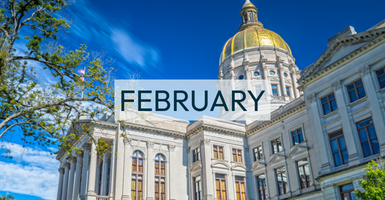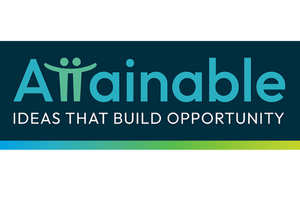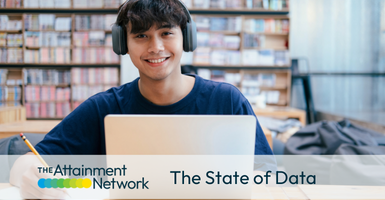Building a Culture of Evidence, Together
Beyond Data: Using Evidence for Informed Decision Making

In late September, The Attainment Network joined partners from across Colorado at Evidence Builders: Creating a Colorado Culture of Impact, a retreat hosted by the Colorado Equitable Economic Mobility Initiative (CEEMI). The event brought together funders, policymakers, data experts, and intermediaries to explore how evidence and evaluation can strengthen Colorado’s education-to-workforce ecosystem.
We recently sat down with our CEO Rana Tarkenton and our Senior Director of Data, Evaluation, and Technology Stefan Richarz to learn about key takeaways from the conference.
Q: You both recently attended CEEMI’s Evidence Builders retreat in Beaver Creek. What stood out most from the experience?
Stefan: For me, I’m still sitting with just how amazing it was to have a small but deeply invested group of leaders talking about the actual why of data in education-to-career systems, pushing beyond the surface and asking the important questions of how data can be used to make evidence-based decisions, use resources efficiently, and ensure our work has the intended impact for learners and earners as well as our communities.
Evidence Builders was a short event (only one full day and two half days) and relatively small (about 60 people) but I have to hand it to Roger Low and his team at CEEMI for putting on what I thought was one of the most needed, thought provoking, and honestly inspirational events I have attended in a long time. I think two things made the event so uniquely impactful: 1) it bridged so many critical roles and perspectives in an ecosystem that rarely sees them in the same room, including policy makers, funders, state agency leaders, other intermediaries, and data/evaluation experts; and 2) there was an intentional focus on why we value data so much in our space and how to push beyond thinking just about “data for data’s sake” and into building and using evidence to make the best possible decisions.
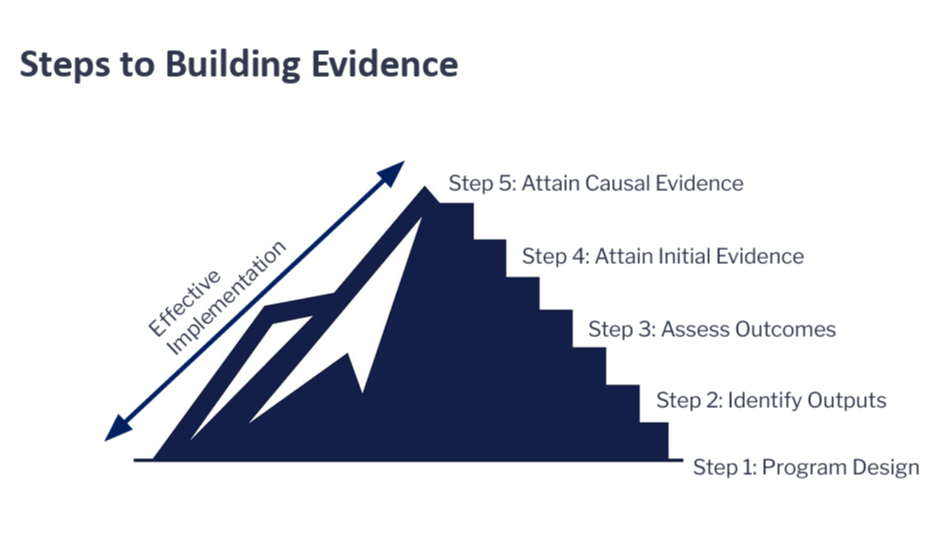
Q: Rana, from your perspective as CEO, what larger lessons did this retreat surface about evidence and learning culture?
Rana: For me, this convening was a reminder that evidence isn’t just about what we know, it’s about what we choose to do with that knowledge to create opportunity and impact.
There is a process to building evidence, and you have to start somewhere. It’s okay if you don’t have everything proven and documented yet. What matters is designing programs so they can be evaluated and improved over time. That’s how we move from evidence-informed to promising to proven. It takes patience, humility, and persistence, but progress starts with a willingness to learn.
Q: What were some of the big questions or ideas that resonated for you during the discussions?
Stefan: How do we push beyond thinking about program outputs and think about actual outcomes? How do we know our efforts lead to quality jobs, good wages, and improved lives? And even when we know all this, how do we ensure that decision makers understand all this and actually use it to inform their decisions?
In my almost 20 years working in Colorado’s educational data systems, this convening pushed these questions the furthest and included leaders and experts from every juncture of the data lifespan. In the space CEEMI created, we heard candidly from everyone on what the challenges are, why data and evidence have or have not worked for their needs, and what we need to do collectively to work toward having a foundation of evidence-informed decision making for policy making and programs across our communities.
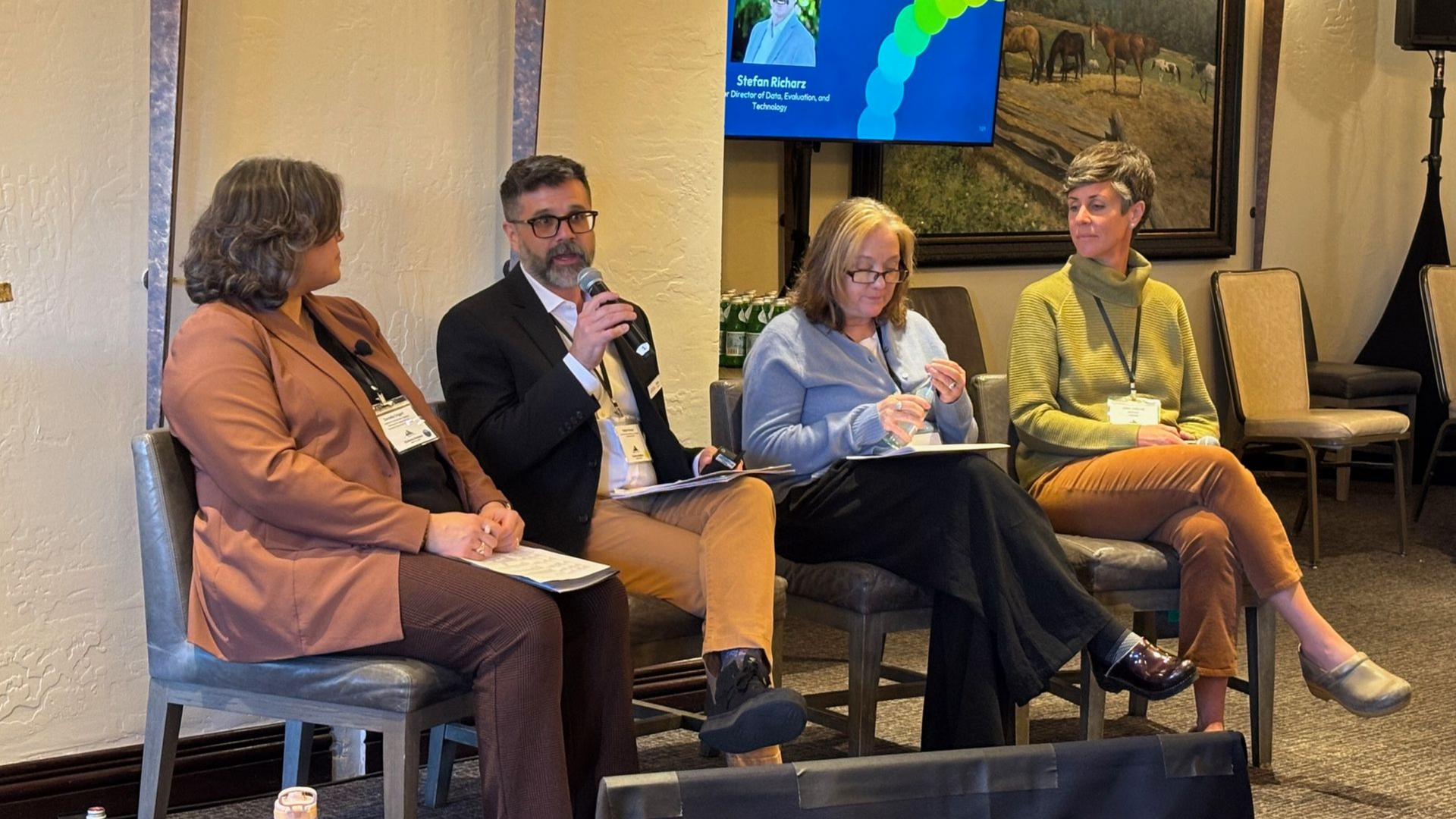
Q: Stefan, you were also part of a panel discussion on Colorado’s State Longitudinal Data System (SLDS). What was your focus there?
Stefan: I was humbled to be asked by CEEMI to participate in a panel discussion about Colorado’s State Longitudinal Data System (SLDS) implementation, specifically elevating our collaborative effort to partner with the state, make sense of the system to our stakeholders, and translate the value and importance of this massive undertaking.
As I’ve learned repeatedly over the last year and a half of the SLDS implementation, communication and bridge building are maybe the most important part of this technical project – you can build a fancy engine but if you don’t have wheels on the car it’s not going anywhere. This event with CEEMI was a great opportunity to get in front of our legislators and funding community to help bridge the why of the SLDS, and I was thankful to be asked to be a part of it.
It was also so cool to see Ashley Maestas who leads our San Luis Valley Partnership once again represent the good work down there and speak to how all this Front Range conversation translates to Colorado’s rural communities. Ashley is a recognized leader in her Valley community, and it was great to watch the appreciation and reactions in the room from statewide leaders. I’m so proud to be her teammate!
Q: How does this idea of evidence-building connect to The Attainment Network’s own approach?
Rana: For The Attainment Network, the CEEMI event was deeply validating of our approach. When our organization began to grow, the first position we added was a Director of Data and Evaluation (thank you, Stefan!). We knew that to fulfill our mission, we had to invest in data early and meaningfully. We don’t have the time or resources to invest in things that don’t work, so we commit to adopting evidence-informed practices, evaluating them, adjusting, and evaluating again. That continuous cycle of learning and implementation is at the heart of our work.
Now, we’re embarking on a multi-year evaluation in the San Luis Valley to test and strengthen our approach, not just for our own learning but to contribute to Colorado’s evidence-building community and identify the most impactful elements for future expansion. We’re measuring the impact of all our strategies, including Project QUEST, a proven program adapted for local needs at the community’s request. If successful, we’ll build on these results to extend and deepen what works, continuing to strengthen the evidence of what works, for whom, and under what conditions.
And in all of this, one reminder stands out: don’t let perfection be the enemy of the good. We may not always have the resources for randomized control trials, but there are many valid ways to build and use evidence. The key is to start, stay curious, and stay committed.
When we lead with clarity of purpose and shared understanding, data becomes a bridge between intention and impact, and that’s how we build systems that don’t just work better but work for everyone.
Q. Is this work getting funded? And what do potential funders need to know about evidence building?
Rana: To do quality evaluation, it’s essential to have support from informed funders — and several who were at the
Evidence Builders convening truly get it. Rigorous evaluation takes both time and resources, and that investment is what allows organizations to learn, adapt, and strengthen their impact. We need more funders who are willing to invest not only in programs themselves but also in the
continuous improvement of those programs. That’s how we move from promising practices to proven results.
Q: You’ve both mentioned “culture of learning” and “continuous improvement.” How do those ideas show up in your work going forward?
Rana: One of the most powerful themes throughout the event was the focus on continuous improvement. Concepts like process improvement, change management, LEAN, and learning mindsets aren’t just operational tools; they are the habits that move us toward a true culture of learning. When program leaders and policymakers embrace these habits, we create the conditions for evidence-building to thrive. Because evidence-informed decision making isn’t just technical, it’s cultural. It requires buy-in, trust, and time. But you have to start somewhere by engaging the doers, the decision makers, and everyone in between.
Stefan: The Evidence Builders event really pushed my thinking in many ways and already has me considering how we bring this conversation to our partners. Of course we have our Better Data for Better Decisions Coalition (to whom I already raved about the event) and our State of the Data event coming up in 2026 where we will no doubt be asking our partners at CEEMI to represent, but more broadly I am thinking about how the ecosystem is craving evidence and so many program leaders don’t know where to start or have the resources to build it out.
Building a data collection process, logic model, theory of change, and tracking multi-year outcomes for your participants is a lot of work, and I see every day folks needing help in those spaces. Envisioning how we can help build resources, clear guidance, and support each other has to be part of this, and that’s why I love my role at The Attainment Network – we get to do that good work daily. CEEMI really put so many pieces together into such a clear vision, looking forward to translating that clarity to our work across Colorado!
Closing Reflection
Events like
Evidence Builders remind us that just collecting data doesn’t result in system change. Real change requires people who are willing to learn, share, and build evidence together. We are incredibly grateful to CEEMI and our other partners across Colorado who are committed to using data to drive programmatic decisions designed to increase opportunities for learners and earners across Colorado.
RECENT ARTICLES
